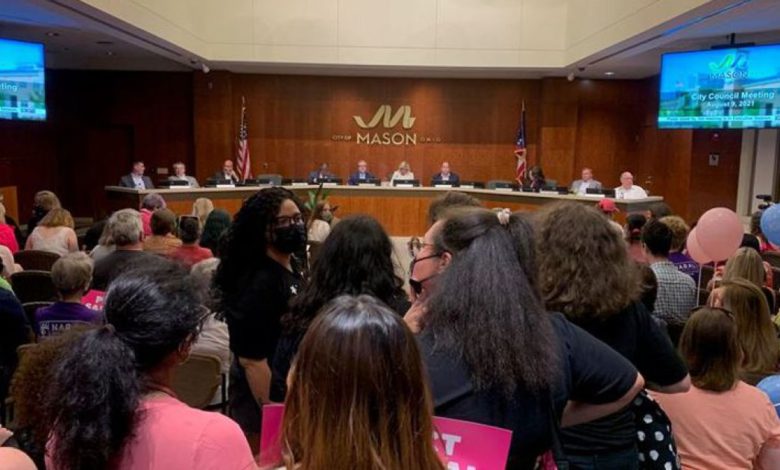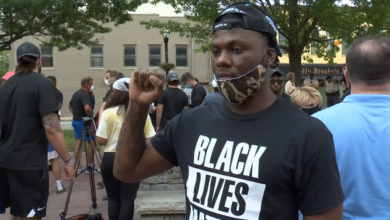
MASON, Ohio — A motion to vote on a proposed abortion ban in Mason failed Monday night; a subsequent motion to put the ordinance on the ballot as a referendum and let the voters decide also failed.
Now the ordinance that, if passed would declare Mason a "sanctuary city," will be back on city council's agenda on Oct. 25.
The ordinance would ban abortion clinics from opening and operating in the city of around 33,000 residents as well as penalize those who assist a woman seeking an abortion. It would not ban contraceptives or the morning-after pill.
Mason’s proposed ordinance would mirror one adopted in late May by Lebanon City Council. There are 39 cities in Texas, Nebraska and Ohio that have made this declaration. Lebanon is the only such city in Ohio.
The proposal in Warren County’s largest city has drawn great debate for months among people on the anti-abortion and pro-choice side of the issue.
The proposed Mason ordinance has an emergency clause to take immediate effect upon adoption. However, Mason Mayor Kathy Grossmann said she was uncertain if there were enough votes on council to adopt it as emergency legislation. Five votes are required to pass emergency legislation.
Grossmann said Mason’s proposed ordinance has been studied, reviewed and revised by the council policy and legislation committee chaired by Councilman T.J. Honerlaw.
When asked if this type of ordinance is within the scope of what a city council should be doing, Grossmann said, “I think it’s within the scope of city council to provide safeguards for residents. This law simply outlaws abortions being done in Mason.”
Grossmann said Mason’s ordinance is similar to the one that was approved in Lebanon. The decision in Lebanon has resulted in such a division that it prompted a large number of candidates to run for city council in the Nov. 2 general election.
Lebanon and Mason do not have abortion clinics within their city limits.
Grossman said there have been a lot of misunderstandings about the ordinance as much of the conversation has been driven by social media. However, Grossmann said it has been a pleasure to have so many residents come to council meetings to speak because it was another way to meet new people.
“I feel like it's time (for council) to work through this,” she said. “It’s been a few tough months and the community needs closure. The community is speaking and it needs to be addressed.”
It was prepared by the same Texas-based right to life organization that worked with Lebanon officials on its ordinance.
"The ordinance that you are looking at today is not something that is new," said Mark Lee Dickson, with Sanctuary Cities for the Unborn. "This has been done by 39 other cities."
Dickson and Sanctuary Cities for the Unborn met with Mason officials in July.
Dickson said the proposed ordinance preserves the status quo and does not create an undue burden for a woman seeking an abortion as set by the Planned Parenthood of Southeastern Pennsylvania v. Casey case that was decided in 1992 by the U.S. Supreme Court. That court also decided the Roe v. Wade case in 1973, which legalized abortion in the nation.
Over the past few months, some Mason meetings have lasted several hours with as many as 60 people speaking to council. Some of those meetings have become raucous by supporters on both sides of the issue and in August, a meeting was ended abruptly by officials because of the disruptions by the audience.
In addition to prohibiting a person from procuring or performing an abortion of any type and at any stage of pregnancy inside the city limits, the ordinance would also outlaw any person from providing transportation to or from an abortion provider; giving instructions over the telephone, the internet, or any other medium of communication regarding self-administered abortion; providing money with the knowledge that it will be used to pay for an abortion or the costs associated in obtaining an abortion; providing abortion doula services; or coercing or pressuring a pregnant mother to have an abortion against her will. It would also be unlawful for any person to possess or distribute abortion-inducing drugs in the city.
The proposed ordinance has an affirmative defense to those acts if the abortion was in response to a life-threatening physical condition aggravated by, caused by, or arising from a pregnancy that, as certified by a physician, places the woman in danger of death or a serious risk of substantial impairment of a major bodily function unless an abortion is performed.
In addition, the proposed ordinance does not permit prosecuting or penalizing the mother of an unborn child that has been aborted, or the pregnant woman who seeks to abort her unborn child.
Mason resident Nikki Foster said she’s unsure what the motive is for council to move forward with this ordinance, which has created so much division in the city.
“Their priorities are screwed up,” Foster said. “It’s disturbing that they are not taking care of their citizens.
“This is a move to undo Roe through small towns, just as they did in Texas,” she said.
Foster said council needs to stay in its lane and focus on infrastructure, public services and public safety and economic development. She also said this ordinance could create unintentional consequences for the city as it recruits new businesses and attracts new residents. It also could create issues with existing companies or major events, such as the Western & Southern Open tennis tournament.
Dozens of pro-choice supporters lined up outside the Mason Municipal Center making their opposition to the ordinance clear. Across the parking lot, pro-life supporters lined up to encourage city leaders to pass the ordinance.
Last Saturday, nearly 200 people participated in a March for Reproductive Freedom in Mason to protest the proposed abortion ban in Mason. The march, organized by the Planned Parenthood Action Council in Warren County, started at Pine Hill Park and ended at the Mason Municipal Center.






